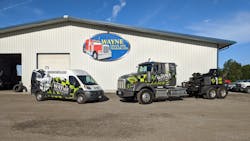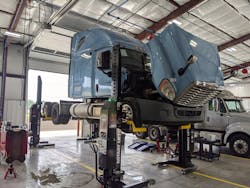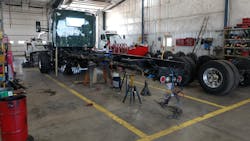Quality over quantity fuels Ohio truck repair shop's success
With parts for trucks hard to come by and technicians with the right experience to work on them equally as challenging, southwest Ohio-based Wayne Truck and Trailer, Ltd., has found a workable solution: focus on quality and the rest will work itself out.
“This business has a lot of moving pieces,” said Irvin Bowman, president of the company. “Lately, it’s been supply chain issues that we’ve had to navigate, but we’ve avoided most of the problems because we go about things differently.
“Our mindset has always been that it’s very important to keep good relationships with vendors,” Bowman explained further. “Without those, we can’t serve our customers effectively.”
The heavy-duty service and repair business has one seven-bay shop north of Dayton off Interstate 70 in Brookville, about the halfway point between Columbus and Indianapolis. Another is off I-75 in Sydney, Ohio, has 12 bays. Between the two, Wayne has about 20 technicians. They offer a range of services, from diesel engine diagnosis and repair for nearly all OEs, to roadside assistance
How it addresses the recent parts shortages that have plagued many service providers in the industry is the latest example of how Wayne Truck and Trailer’s philosophy helps it better serve area fleets and over-the-road customers. The suppliers, Bowman noted, go out of their way to help find the parts the shop needs. That includes local distributors and dealers who have gone the extra mile by using their nationwide networks.
For Bowman, the success of the business he founded in 2008 is also the result of providing service in a timely fashion at a fair price. “We work with customers who understand and appreciate that, and that’s why we’ve become the first choice for service for a growing number of fleets in our area,” he said. “Our focus on quality over quantity has meant our sales are increasing.”
Wayne Truck and Trailers’ shops also keep customer count below actual capacity to ensure every truck or trailer that comes in for service is well taken care of.
“We don’t accept any business just to make money,” Bowman said. “We’re selective so our priority stays on serving our regular customers.”
That approach also allows the maintainer staff the proper number of technicians. Today, Bowman noted, it takes more work than in previous times to get good talent. As a result, focusing on building a better staff has been a main goal for the company.
“We don’t believe that the industry’s technician shortage is as much an issue of finding enough qualified people as it is a lack of the ability to train people and get them up to speed effectively,” asserted Bowman, who argued a technician’s work experience could be deceiving if they “were never taught how to do things right.”
He cited two causes for the problem: shops generally lacking adequate training methods and many schools not providing actionable instruction.
Training programs are a key part of the operation at Wayne Truck and Trailer. Once a week at each of its two facilities, the company holds a class that’s taught by Bowman, a service advisor or one of the shop’s more experienced technicians—along with a free lunch, as well. The classes cover the basics of shop operations, and specific components and systems. On-demand training courses are also available.
In addition, senior technicians routinely mentor the shops junior technicians. This type of training includes showing and explaining how and why they are making a specific repair, as well as providing oversight to the junior techs’ service jobs to verify the repair or preventive maintenance was made correctly.
“That fresh set of eyes is educational for all our technicians, and improves quality control,” Bowman noted
Building a positive shop culture also leads to a more productive and efficient operation at Wayne Truck and Trailer. “We work on making our facilities more friendly and cleaner places to work,” Bowman said. “Our shops are not necessarily better equipped but the atmosphere we have makes it a challenge for people to want to work elsewhere. The technicians we have lost were ones who were having a hard time fitting in.”
Bowman also pointed to a focus on working with customers to give them what he said are “expectations that match reality.” In that regard, reducing unscheduled downtime is the key, something he relies on integrated shop management systems to facilitate.
“We’re taking advantage of our Fullbay service shop software to improve uptime,” Bowman stated. “With KPIs, for example, we can see if our labor time estimates are accurate. Perhaps most importantly, the software points to strengths and weaknesses, so the efficiency and productivity of our shop operations and technicians can be improved.”
Looking across the heavy-duty service provider landscape, Bowman is focused on the future. “The industry is not paying attention to the number of independent shops that will disappear when their owners retire,” he said. “The growing shortage of service capacity is more alarming to me than the technician shortage, but it’s also an opportunity for companies like ours. With our business philosophy, we expect to continue realizing success.”
About the Author

Seth Skydel
Seth Skydel, a veteran industry editor, has more than 36 years of experience in fleet management, trucking, and transportation and logistics publications. Today, in editorial and marketing roles, he writes about fleet, service, and transportation management, vehicle and information technology, and industry trends and issues.


